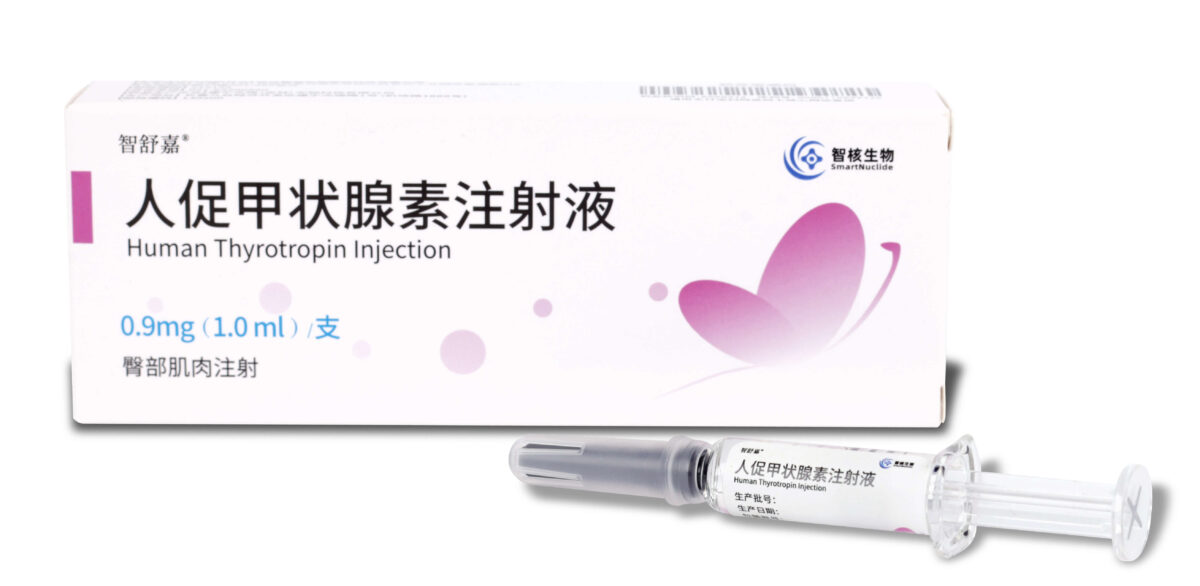SmartNuclide’s new drug approved for treatment of differentiated thyroid cancer in China
Suzhou, April 11, 2024 – Suzhou Smartnuclide biopharmaceutical co ltd today announced that on April 11, 2024, China’s National Medical Products Administration (NMPA) approved Zhishujia®️ (recombinant human thyrotropin), use as an adjunctive treatment for radioiodine ablation of thyroid tissue remnants in patients for patients who have undergone a near-total or total thyroidectomy for well-differentiated thyroid cancer and who do not have evidence of distant metastatic thyroid cancer. Zhishujia®️ is the first and only recombinant human thyrotropin approved by NMPA, registered as a 2.1 improved new drug.
According to estimates from the National Cancer Center, there were 466,000 new thyroid cancer cases in China in 2022, ranking it third among all types of malignant tumors. Differentiated thyroid cancer is the main type of thyroid cancer. It accounted for more than 95% of total cancers. The national average incidence rate is 14.6/100,000, with a high incidence in urban areas. The incidence rate in Beijing, Shanghai, Guangzhou, and Shenzhen is as high as 40-50/100,000. In the past 10 years, the incidence of thyroid cancer in women has increased drastically by more than 20% per year. The five-year survival rate of thyroid cancer in China is 84.3%, far lower than that of the United States (98.3%).
Thyroid surgery + postoperative iodine-131 therapy + thyroid-stimulating hormone (TSH) suppression therapy is the standard treatment for differentiated thyroid cancer. Before the real-time assessment or iodine-131 treatment of differentiated thyroid cancer patients after a total thyroidectomy or near-total thyroidectomy, it is necessary to increase the TSH level to stimulate Thyroglobulin (Tg) secretion and promote iodine-131 uptake, so as to better evaluate the patients’ condition and improve the effectiveness of the iodine-131 treatment.
There are two main ways to increase thyroid-stimulating hormone levels in the body. The first method is the traditional thyroid hormone withdrawal (THW) method, which involves stopping taking levothyroxine sodium tablets (L-T4) for 2-4 weeks. The second method is to give exogenous rhTSH.
Previously, due to the lack of rhTSH drugs in China, the only way to improve TSH before iodine-131 treatment was to stop taking L-T4. However, patients would feel the malaise caused by hypothyroidism after halting L-T4. And they would also face the potential risk of lesion proliferation. In addition, the number of radionuclide therapy beds in the nuclear medicine departments was limited. The use of rhTSH can avoid situations where patients may not be able to meet the TSH standard after they stop using L-T4. It can also help patients who cannot tolerate hypothyroidism receive high-quality treatment. Additionally, it helps the nuclear medicine departments to use the beds optimally and can help alleviate the shortage of medical resources. This can help meet the clinical needs of doctors and patients in all aspects.
According to reports, rhTSH was first marketed in the United States in 1998. It was produced by Genzyme, and sold in more than 60 countries and regions, including Taiwan and Hong Kong, China, but had not entered the Chinese mainland market. With nearly 30 years of clinical usage, this class of drugs has been recommended by many thyroid cancer doctors at home and abroad. The launch of the human thyrotropin injection will fill a gap in China.
